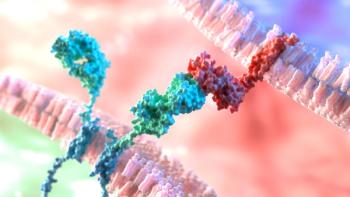
KRAS G12C Inhibitor Shows Promising Effects in NSCLC, Other Solid Tumors
A pair of abstracts based on a phase 1/2 trial of adagrasib (MRTX849) a KRAS G12C inhibitor, showed promising results for patients with lung, bowel, and other solid tumors, researchers reported at the 32nd EORTC-NCI-AACR Symposium on Molecular Targets and Cancer Therapeutics.
A pair of abstracts based on a phase 1/2 trial of adagrasib (MRTX849) a KRAS G12C inhibitor, showed promising results for patients with lung, bowel, and other solid tumors, researchers reported at the 2020 European Organisation for Research and Treatment of Cancer (EORTC), the National Cancer Institute (NCI) and the American Association for Cancer Research (AACR)
The phase 1/2 KRYSTAL-1 trial (
Although KRAS is the most commonly altered oncogene in human cancers, no KRAS inhibitors were given FDA approval for clinical trials until 2018. Adagrasib was one of a group of KRAS inhibitors green lit for clinical trials starting in January 2019.
One
“KRAS p.G12C patients are a population where there are no proven targeted therapies. Once chemotherapy or immune therapy fails in a patient, the treatment options are limited,” lead author and presenter Pasi A. Jänne, MD, PhD, director of the Lowe Center for Thoracic Oncology, Dana Farber Cancer Institute, and professor of medicine at Harvard Medical School,
There were 14 patients in phase 1/1b of the trial who were followed for longer, with a median time frame of 9.6 months. Six, or 43%, of those patients saw an objective response and 5 of the 6 were still being treated as of the August 30 cutoff date for inclusion in the dataset analyzed for the abstract. Treatment has lasted longer than 11 months in 4 of those patients.
Another
The CRC cohort included 18 evaluable patients, 3 (17%) of which had objective responses to the treatment, and 2 of which were still receiving adagrasib as of August 30. CRC patients had a 94% disease control rate, and 12 of those 17 patients were still being treated. Of the 18 in the CRC cohort, 10 had been on treatment for more than 4 months at the time of the analysis.
In a group of 6 patients with other solid tumors, 4 of them—one patient each with endometrial cancer, pancreatic cancer, ovarian cancer, and bile duct cancer—had partial responses. Two patients with appendiceal cancer achieved stable disease, and all 6 were still being treated at the time of the analysis.
Researchers concluded that adagrasib showed durable clinical activity in patients with previously treated NSCLC and KRAS p.G12C mutation. In pretreated patients with CRC and other solid tumors, they determined that the clinical activity was promising. The trial found that the safety profile is acceptable, with the most common adverse effects being nausea, diarrhea, vomiting, fatigue, and increased levels of an enzyme that indicates minor liver irritation.
References
1. Targeted inhibitor of mutated KRAS gene shows promise in early trial for lung, bowel, and other solid tumors. News Release. Dana-Farber Cancer Institute; October 24, 2020. Accessed October 29, 2020.
2. Jänne PA, Rybkin II, Spira AI, et al. KRYSTAL-1: Activity and Safety of Adagrasib (MRTX849) in Advanced/Metastatic Non–Small-Cell Lung Cancer (NSCLC) Harboring KRAS G12C Mutation. Abstract presented at: 32nd EORTC-NCI-AACR Symposium on Molecular Targets and Cancer Therapeutics; October 24-25, 2020. Abstract 3LBA.
3. Johnson ML, Ou SH, Barve M, et al. KRYSTAL-1: Activity and Safety of Adagrasib (MRTX849) in Patients with Colorectal Cancer (CRC) and Other Solid Tumors Harboring a KRAS G12C Mutation. Abstract presented at: 32nd EORTC-NCI-AACR Symposium on Molecular Targets and Cancer Therapeutics; October 24-25, 2020. Abstract 4LBA.
Newsletter
Stay ahead of policy, cost, and value—subscribe to AJMC for expert insights at the intersection of clinical care and health economics.









